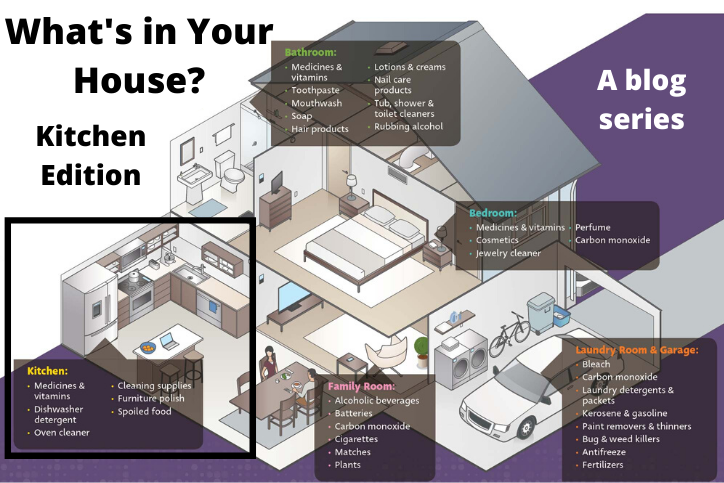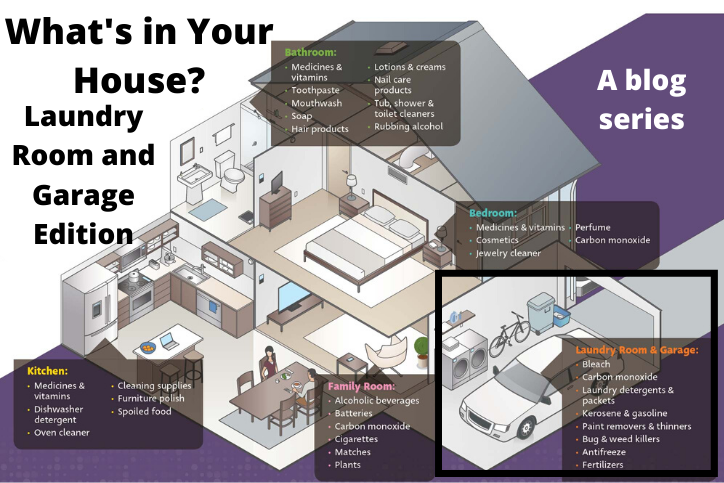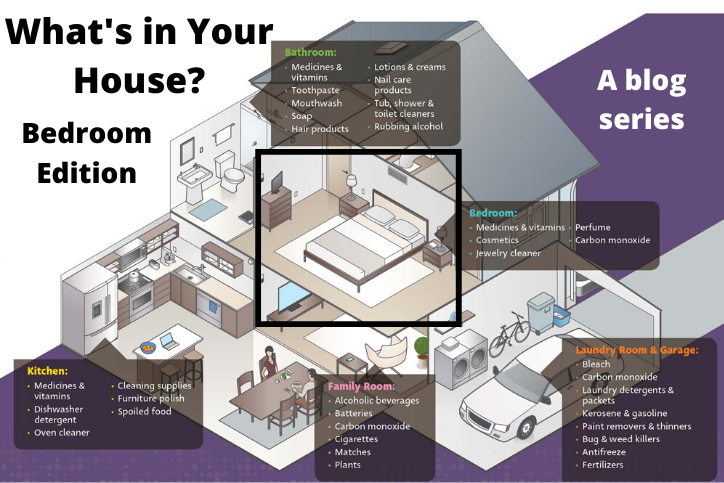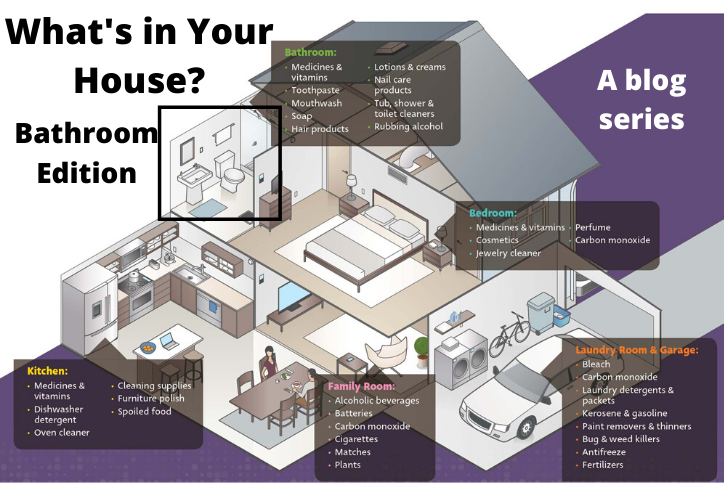What makes a house a home? Some may say the people in it. Others may say the things inside of it. No matter your opinion, we all take steps to make our houses more “home-y,” which should include safety. Whether you spend the whole day at home, or just a few hours, you’ll want to make sure it is a safe place for you and your family to enjoy.
Keeping that thought in mind, we’d like to welcome you to the first edition of our home safety series. More than 90% of poisonings happen in the home. This series will take a close look at some of the poison hazards that you might find in different rooms in your house. Below, we’ll start in the kitchen. Keep an eye out for these potential poisons in your kitchen, and make sure you use and store them safely.
Medicines and Vitamins
Safe Use: We talk a lot about medicine safety because, in recent years, about 80% of the cases we managed involved some type of drug. The most common drug substances we are called about are analgesics (pain relievers), sedatives and antipsychotics, and antidepressants. To use medicines and vitamins safely, it’s important that you read the label every time medicine is used and follow the directions about when, how, and how much to take. Read the warnings section of the label to learn about possible drug interactions to help prevent unwanted side effects and make sure the medicines work as they should. If you are taking multiple medicines, check the labels for over-lapping ingredients. Taking too much of an active ingredient could cause an overdose. Check with your doctor about vitamins and supplements before taking them, as they can interact with other medicines you take.
Safe Storage: The best way to prevent medicine and vitamin mishaps is to keep them up, away, and out of sight. They should be kept in child-resistant containers between use. Daily pill minders are not child-resistant. If you have children in your home, make sure you keep those containers up, away, and out of sight as well. If you have visitors, offer them a place to safely store their belongings. Regularly dispose of unused and expired medicines, as they can put children, teens, adult, older adults, and pets at risk. Permanent drop-off locations can be found here. There are also two Take Back Days offered by the Drug Enforcement Agency (DEA), usually in October and April. Simple instructions for home disposal are available here.
Dishwasher Detergent
Safe Use: Whether you use detergent in powder, liquid, tablet, or pod form, there are dangers associated with handling and/or ingesting these substances. A majority of the poisoning cases reported to poison control centers about these products occurred in children. Proper storage and use of child-resistant packaging can prevent poisoning exposures. Do not touch your eyes while or after handling these products, as it can cause pain and irritation. Getting small amounts in the mouth may also cause irritation. Call your poison center at 1-800-222-1222 if this happens. If any product spills on the ground or another surface, clean it up right away.
Safe Storage: Where do you keep your dishwasher detergent? The most popular answer is under the sink. If there are children in your home, store these products in a locked cabinet or other place that a child doesn’t have easy access to. Oftentimes, the packaging will be colorful and include attractive pictures of food, which can confuse a child. The smell is also typically an attractive scent, which can add to a child’s confusion.
Cleaning Supplies
Safe Use: In addition to medicines, we receive many calls about cleaning supplies. Young children often get into these products because they are kept in a space where they can easily get into it. If any product gets in the eye or mouth, call our poison experts to ensure your safety.
Safe Storage: Always supervise children around cleaning supplies. Remember, they like to imitate adult behavior and may join your cleaning time. Child-resistant cabinet locks can slow down a child from getting into the cabinet where you may keep cleaning supplies. As older children begin to help you clean, teach them the proper way to use the product, including how to read the label and how to follow the directions.
Oven Cleaner and Drain Opener
Safe Use: Breathing in the fumes, getting these substances on the skin or in the eye, and swallowing these substances can be harmful. Read the directions on the label before use and follow them closely to minimize unwanted effects. If the smell becomes overwhelming, open a window or vent in the area and leave until the odor lessens.
Safe Storage: Because these substances can cause more severe effects than other cleaners, we suggest storing them all in a locked cabinet.
Spoiled Food
Safe Use: Regularly clean your fridge. Leftovers should not be kept or eaten more than 3-4 days after being cooked. Leftovers should be put in the fridge or freezer within two hours of being cooked. For more information on food safety, visit https://www.foodsafety.gov/.
Alcohol
Safe Use: Alcohol can be found throughout your home, even in less obvious places. The kitchen is the spot where you will most likely find alcoholic beverages and cooking extracts. The amount of alcohol in beverages varies. The effects of drinking alcohol depend on the concentration and amount consumed. You may be surprised to learn that there is alcohol in cooking extracts such as vanilla (35-45%), lemon (80%), orange (80%), and mint (90%). Most recipes call for only small amounts of these extracts, and most households commonly have the small bottles on-hand. Keep these bottles out of children’s reach. Extracts can be dangerous if consumed in large amounts.
Safe Storage: All alcohol should be kept up, away, and out of sight from children. Do not leave alcoholic beverages where children can reach, as they may mistake it for juice.
These are the main items to watch out for to help make your kitchen a safe space for family and friends alike. Tune in over the next few months to learn about poison dangers in other rooms in your house and steps you can take to make those rooms poison safe. If you think someone has ingested any of the above products, call the poison center right away at 1-800-222-1222. Pharmacists and nurses will determine what steps should be taken. Do not wait for symptoms!





Leave a Reply